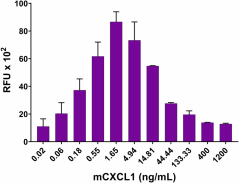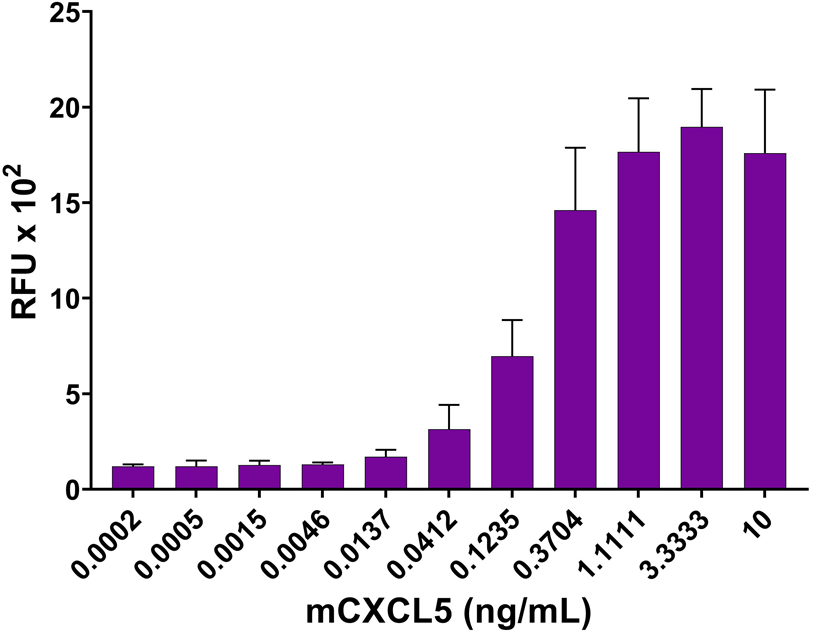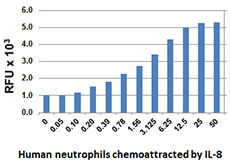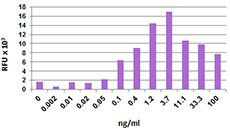- Regulatory Status
- RUO
- Other Names
- KC, Secreted protein N51, FSP, Grow regulated oncogen 1 (GRO1), Grow regulated oncogen a (GRO a), Melanoma growth stimulating activity (MGSA), MGSA-a, neutrophil activating protein 3 (NAP-3), SCYB1
- Ave. Rating
- Submit a Review
- Product Citations
- 3 publications

| Cat # | Size | Price | Save |
|---|---|---|---|
| 573702 | 10 µg | ¥35,030 | |
| 573704 | 25 µg | ¥76,020 | |
| 573708 | 500 µg | ¥606,160 |
The CXCL1/KC gene was initially identified as being regulated by PDGF in BALB/c-3T3 cells. CXCL1/KC is an ELR CXC chemokine, and it is structurally and functionally related to the human GROs (CXCL1-CXCL3) and interleukin-8 (CXCL8). CXCL1, CXCL2, and CXCL3 bind to the CXCR2 receptor, with CXCL1 having the highest affinity. CXCL1 is crucial for the recruitment of neutrophils to inflammatory sites. In addition, CXCL1 has pleiotropic effects on cell proliferation, tumor angiogenesis, invasion, and metastasis. CXCL1 and CXCL2 induce neutrophil mobilization from the bone marrow in a murine model of acute peritonitis, and CXCL1 and G-CSF act cooperatively in this process. In addition, CXCL1 mediates murine sickle cell vasoocclusion during hemolytic transfusion reactions. Thrombin enhances the secretion of CXCL1 from tumor cells, and PGE2 stimulates expression of CXCL1 in human colorectal carcinoma cells (CRC). Furthermore, CXCL1 (secreted by CRC cells) induces endothelial cell migration and tube formation in vitro and in vivo. CXCL1 is induced by inflammatory cytokines such as IL-1 and TNF, and IL-17A enhances expression of CXCL1 by prolonging the half-life of its constitutively unstable mRNA.
Product DetailsProduct Details
- Source
- Mouse CXCL1, amino acids Asn29-Lys96 (Accession# NM_008176.3) was expressed in E. coli.
- Molecular Mass
- The 68 amino acid recombinant protein has a predicted molecular mass of approximately 7.4 kD. The DTT-reduced protein migrates at approximately 10 kD and non-reduced protein migrates at slightly higher than 10 kD by SDS-PAGE. The N-terminal amino acid is Asparagine.
- Purity
- >98%, as determined by Coomassie stained SDS-PAGE.
- Formulation
- 0.22 µm filtered protein solution is in PBS.
- Endotoxin Level
- Less than 0.01 ng per µg cytokine as determined by the LAL method.
- Concentration
- 10 and 25 µg sizes are bottled at 200 µg/mL. 100 µg size and larger sizes are lot-specific and bottled at the concentration indicated on the vial. To obtain lot-specific concentration and expiration, please enter the lot number in our Certificate of Analysis online tool.
- Storage & Handling
- Unopened vial can be stored between 2°C and 8°C for up to 2 weeks, at -20°C for up to six months, or at -70°C or colder until the expiration date. For maximum results, quick spin vial prior to opening. The protein can be aliquoted and stored at -20°C or colder. Stock solutions can also be prepared at 50 - 100 µg/mL in appropriate sterile buffer, carrier protein such as 0.2 - 1% BSA or HSA can be added when preparing the stock solution. Aliquots can be stored between 2°C and 8°C for up to one week and stored at -20°C or colder for up to 3 months. Avoid repeated freeze/thaw cycles.
- Activity
- Recombinant mouse CXCL1 (KC) chemoattracts Baf3-mCXCR2 transfectants in a dose-dependent manner. The ED50 for this effect is 0.1– 0.6 ng/mL.
- Application
-
Bioassay
- Application Notes
-
BioLegend carrier-free recombinant proteins provided in liquid format are shipped on blue-ice. Our comparison testing data indicates that when handled and stored as recommended, the liquid format has equal or better stability and shelf-life compared to commercially available lyophilized proteins after reconstitution. Our liquid proteins are verified in-house to maintain activity after shipping on blue ice and are backed by our 100% satisfaction guarantee. If you have any concerns, contact us at tech@biolegend.com.
- Product Citations
-
Antigen Details
- Structure
- Chemokine
- Distribution
-
CXCL1 is produced by neutrophils, activated monocytes, macrophages, fibroblasts, keratinocytes, epithelial cells, and endothelial cells.
- Function
- CXCL1 chemoattracts neutrophils, and induces cell proliferation, tumor angiogenesis, invasion, and metastasis. CXCL1 is induced by IL-1, TNF, thrombin, and PGE2.
- Interaction
- Neutrophils and endothelial cells
- Ligand/Receptor
- CXCR2
- Biology Area
- Cell Biology, Neuroinflammation, Neuroscience, Signal Transduction
- Molecular Family
- Cytokines/Chemokines
- Antigen References
-
1. Cochran BH, et al. 1983. Cell 33:939.
2. Anisowicz A, et al. 1987. P. Natl. Acad. Sci. USA 84:7188.
3. Caunt M, et al. 2006. Cancer Res. 66:4125.
4. Wang D, et al. 2006. J. Exp. Med. 203:941.
5. Wengner AM, et al. 2008. Blood 111:42.
6. Stillie R, et al. 2009. J. Leukoc. Biol. 86:529.
7. Datta S, et al. 2010. J. Immunol. 184:1484.
8. Jang JE, et al. 2011. J. Clin. Invest. 121:1397. - Gene ID
- 14825 View all products for this Gene ID
- UniProt
- View information about CXCL1 on UniProt.org
Related FAQs
- Why choose BioLegend recombinant proteins?
-
• Each lot of product is quality-tested for bioactivity as indicated on the data sheet.
• Greater than 95% Purity or higher, tested on every lot of product.
• 100% Satisfaction Guarantee for quality performance, stability, and consistency.
• Ready-to-use liquid format saves time and reduces challenges associated with reconstitution.
• Bulk and customization available. Contact us.
• Learn more about our Recombinant Proteins. - How does the activity of your recombinant proteins compare to competitors?
-
We quality control each and every lot of recombinant protein. Not only do we check its bioactivity, but we also compare it against other commercially available recombinant proteins. We make sure each recombinant protein’s activity is at least as good as or better than the competition’s. In order to provide you with the best possible product, we ensure that our testing process is rigorous and thorough. If you’re curious and eager to make the switch to BioLegend recombinants, contact your sales representative today!
- What is the specific activity or ED50 of my recombinant protein?
-
The specific activity range of the protein is indicated on the product datasheets. Because the exact activity values on a per unit basis can largely fluctuate depending on a number of factors, including the nature of the assay, cell density, age of cells/passage number, culture media used, and end user technique, the specific activity is best defined as a range and we guarantee the specific activity of all our lots will be within the range indicated on the datasheet. Please note this only applies to recombinants labeled for use in bioassays. ELISA standard recombinant proteins are not recommended for bioassay usage as they are not tested for these applications.
- Have your recombinants been tested for stability?
-
Our testing shows that the recombinant proteins are able to withstand room temperature for a week without losing activity. In addition the recombinant proteins were also found to withstand four cycles of freeze and thaw without losing activity.
- Does specific activity of a recombinant protein vary between lots?
-
Specific activity will vary for each lot and for the type of experiment that is done to validate it, but all passed lots will have activity within the established ED50 range for the product and we guarantee that our products will have lot-to-lot consistency. Please conduct an experiment-specific validation to find the optimal ED50 for your system.
- How do you convert activity as an ED50 in ng/ml to a specific activity in Units/mg?
-
Use formula Specific activity (Units/mg) = 10^6/ ED50 (ng/mL)
















Follow Us